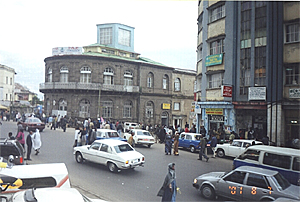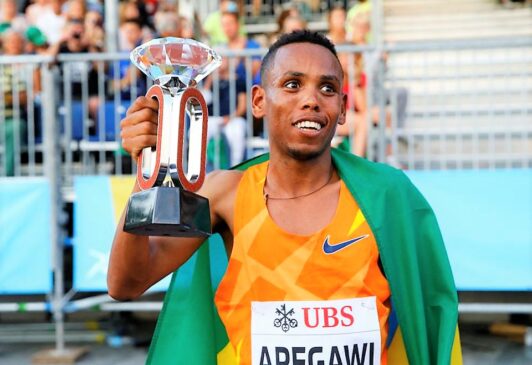ITALY – ETHIOPIA 1 – 1

Addis Ababa, Ethiopia – When you are sitting in a café at the Piassa sipping a foamy macchiato in front of the rationalist building of the Ethiopian Electric Power Company or the Arada Branch office of the Bank of Abyssinia, you immediately notice that Ethiopia and Italy have an especially close relationship.
Names, food, even the architecture all remind one of the past colonial power.
Italy, a latecomer among colonial powers, occupied Eritrea in 1890 and tried to do the same with Ethiopia, which, at the time was the only big independent country in Africa. But, unexpectedly, the Italian troops of General Oreste Baratieri were defeated by the army of the Emperor Menelik II in the Battle of Adwa. It was the first time in history that an African country had won a big battle against a European colonial power and, according to the historian Henze, “a fundamental turning point in Ethiopian history.â€Â
Ethiopia remained independent until 1936, when the Italian fascist regime, which had seized power in 1922, decided to take its revenge for the defeat of Adwa. Benito Mussolini‘s troops, headed by the General Emilio De Bono, occupied the country (with the aid of chemical arms,) which consequently became part of the Italian Empire. But only five years later, in 1941, Ethiopian patriot fighters with the help of the British Army liberated the country.
The Battle of Adwa and the victims of the terrible massacres carried out by the troops of the Marshal Rodolpho Graziani in retaliation against a failed assassination attempt, are still in the memory of the Ethiopian people. The date of the Battle of Adwa (March 1) is a national holiday and the Ethiopians who perished during the Italian occupation still remember in the Yekatit 12 monument located at Sidist Kilo.

Visiting places, speaking to people, going into a restaurant or bar, you discover a huge Italian heritage. Places like Piassa, which means square in Italian, or Mercato which means market in Italian, or Casainchis which is taken from Casa INCIS, the former Italian Institute which built the compound for Italian civil servants during the thirties, obviously are Italian names. Also in the architecture the Italian heritage in Addis is relevant. Some prestigious buildings in the Piassa area as well as the monumental Cathedral of Saint George were all built by Italian architects. However, most of the Italian ties can be retrieved in Ethiopian food; and not only in the famous macchiato coffee, (Caffé macchiato) you can find it in many cafés made with traditional Italian espresso machines. The population largely eats pasta and you can find lasagne, pasta al forno, penne, spaghetti (all perfect Italian names for different kinds of pastas) in many Ethiopian restaurants and homes, together with the famous pizza. To highlight the special relationship between Ethiopia and Italy is one common dish made by mixing injera with spaghetti, called locally, pasta saltata. Finally, you can find other Italian ties in names like makina, which means car.
Even more unexpected than the heritage in names, food and architecture is the positive attitude Ethiopian people have towards Italy and Italians nowadays. It seems that the generous Ethiopian people have forgiven the Italians for their colonial past and have kept only the good things the Italians brought to Africa. In fact, the community of Italians living in Ethiopia has been alive and economically active since then. And Italian institutions have supported the development of the country through projects of cooperation, business and infrastructure.
In my own personal experience, it almost seems that Italians are reserved a special positive treatment by the Ethiopian people. When you are asked “Where are you from?†and your answer is “I’m Italian,†very often the person you are talking to becomes more interested in you than before. Some of them have a parent, a relative, a cousin who lives in Italy. Some of them have actually lived in Italy for either a long or short period of time. A lot of them know some Italian phrases – i.e. “non c’é problema†(no problem) – or just single words. And even if they don’t have any relatives in Italy or don’t speak a single word of Italian, gently and politely you are asked about Roberto Mancini or Mario Balotelli (famous Italian players and coaches.)

Leaving aside the historical ties, Ethiopian and Italian people tend to have a good relationship, maybe because they also share some of the same values: both place great importance on the family, both love children and both are very religious people (Italians less than they used to be, anyway.) And, last but not least, they both share the same immense passion for football. That of football is certainly one the most unexpected similarities between Italians and Ethiopians. Italians love mainly their own league (the Serie A) and their own teams (Juventus happens to be the name of the most famous Italian meeting place in Addis the “Circolo Sportivo Italiano Juventus†which means Italian Sports Club Juventus.) But Ethiopians are often even more keen and up to date on that matter than Italians, including even Italian football, although they may especially be fond of English and Spanish football.
The common passion for football could be an important tool for both Italians and Ethiopians to improve their mutual knowledge. In fact, Ethiopians know much more about Italy than Italians tend to believe even though their knowledge ought to be a bit more improved and updated. On the contrary, many Italians (in Italy) ignore almost everything about Ethiopia, except that it is an African country and a former colony. It would be nice, for example, to organize a match between gli azzurri (the Italian national team) and the national team of Ethiopia in Addis. The Ethiopian people would have the chance to watch their team playing against one of the top world teams and Italian people would have the chance, through football, to get to know a little more about a country that has so many ties to their own country.
Writer: Roberto Moscardi is on an internship at The Reporter Newspaper in Addis Ababa, Ethiopia.



